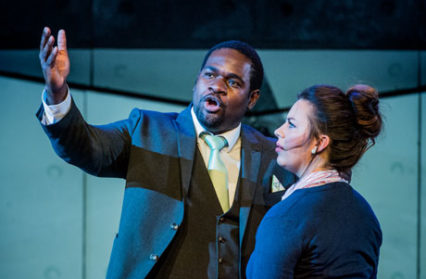Celebrating the centenary of Leonard Bernstein and the operatic settings of Shakespeare, Welsh National Opera’s 2018 gala was an eclectic mix of theatre favourites. From Candide through Cosi fan Tutte to Brush Up Your Shakespeare, James Southall’s WNO provided a hugely varied evening energised with dramma giocoso and musical alike.

Opening the Gala with the Candide Overture, an impressive concert piece in its own right, the orchestra were off to a racing start with a strong tempo and admirable dynamics. Their practice of the latter was especially clear as the string and brass sections did not interfere with each other as they so often can. Needless to say, it is common for the brass to drown out the strings, even when they need not. But in the performance of this overture, it did not feel like a competition as it usually does. Southall had obviously paid particular attention to this during rehearsals.
The vocal numbers from Candide were enjoyable, with Andra Citiul in the role of Cunegonde standing out as the top performer. Her singing was good, but her facial expressions and overall acting made it fairly difficult to focus on anyone else. One ought to be able to judge a great deal of an opera singer’s ability from what they do with their face; too often it is forgotten that they must act as well as sing. But, thankfully, not by Citiul.
When it came to the Gala’s Rossini duet – Ai capricci della sorte – both Christine Byrne’s Isabella and William Stevens’s Taddeo could have been louder. Their enunciation was noticeably well practised, though. This was built upon in the sextet from Cosi, and emphasised by the suitably soft orchestral accompaniment. The singers were allowed enough room to be heard, the tenor being especially audible but not overpowering. Allowing each of the six voices to be heard over the orchestra is always a problem when performing a piece such as this, but WNO dealt with it well.
Next came the Berlioz – two pieces from Beatrice and Benedict – which naturally required a quite different approach. Although not one of his epic five-act grand operas, Beatrice and Benedict demand no less vigour than Berlioz’s other works. His sound makes its presence well known, in being unashamedly less lyrical than Mozart whilst retaining its Italian roots. The first piece, Ils m’en souvient for mezzo-soprano, would have benefitted from greater chemistry between conductor and singer. At one point, mezzo Sophie Dicks sung a little too early when she was supposed to sing simultaneously with the flute, after a pause. If there had been closer work between conductor and singer, this wouldn’t have happened.
Soprano Andra Citiul gave another impressive performance in the Nocturne duet, alongside mezzo Byrne in the role of Ursula. They kept together well, but Byrne could learn a lot from Citiul regarding expression and projection. Underneath, the orchestra provided a soft, glowing backdrop to the singers.
The second half opened with Donizetti’s L’elisir d’amore. Southall conducted the choir and orchestra together well, but the tenor sometimes had trouble projecting his sound. Despite this, he formed a fruitful partnership with the baritone even though they had tough rhythms to cope with. And it was refreshing to see Lowri Porter, the orchestral leader, actually directing the ensemble this time.
Returning to the Shakespeare theme, Citiul has sung Giulietta and Dicks sung Romeo in Bellini’s take on the great tragic romance. Romeo was fairly convincing, and the pair had a strict command of tempi changes – a trying task in a duet. Once again, Citiul filled the hall with her voice and, this time was given the chance to demonstrate her skill in cadenzas. They were excellently controlled; never too much, never too little. Perhaps her soaring soprano is best suited to bel canto roles.
Then came a strange aria from Britten’s Midsummer’s Night Dream – inhabiting an altogether different world – featuring the countertenor Kieran-Connor Valentine in the role of Oberon. There were points when the tender sound of a solo string instrument, either a cello or viola, seemed to melt perfectly into the tenor’s voice. On top of this, the harps contributed a percussive dimension. But it was not easy to adjust to the sound of a countertenor after the preceding pieces, they being more canonical. It generally took the room by surprise – a surprise that was hardly helped by the way in which Valentine stared at audience members. It was really quite off-putting.
A little-known piece appeared next – Nicolai’s Merry Wives of Windsor – the only German contribution of the evening. And it was altogether an impressive performance of a rarely heard work. The orchestra glided through tutti passages which Southall had obviously rehearsed thoroughly. There followed a pleasing duet with a beautiful conclusion involving the soprano, tenor and first violin.
The Gala ended with a hilarious rendition of Brush Up Your Shakespeare, followed by an ensemble piece from Candide. All in all, Welsh National Opera gave an interesting concert with an enormously varied repertoire of Shakespeare Esque performances. Cardiff should look forward to the next one.
For more information on WNO‘s Opera Gala, take a look at their website.
Edward Christian-Hare is a regular contributor to Wales Arts Review.










